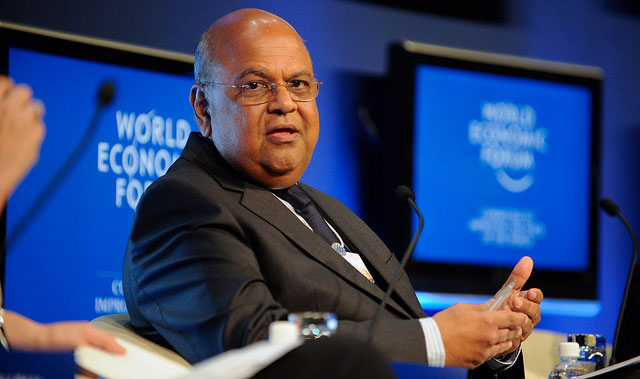
South Africa will increase taxes and limit spending as it tries to fend off a junk credit rating after signalling it will miss budget deficit, debt and growth targets for the next three years.
Additional taxes, details of which will be announced in February, will raise an extra R43bn over the next two years, while the government’s expenditure ceiling will be trimmed by R26bn, the national treasury said in its mid-term budget, released in Cape Town on Wednesday. It lowered growth forecasts until 2018 and projected wider fiscal deficits.
“The numbers that we talk about here demonstrate our commitment to fiscal consolidation,” Lungisa Fuzile, the treasury’s director-general, said in an interview. “Will the ratings agencies buy that? I don’t know. I hope they do. If we act over-zealously, there is a risk that we could end up with a contraction, which gives us lower revenues and we will, in effect, even end up with a wider deficit than we are trying to achieve.”
S&P Global Ratings, Fitch Ratings and Moody’s Investors Service are due to review South Africa’s credit rating in the next two months and have said reviving growth and reining in debt and government spending are key to averting a downgrade.
Finance minister Pravin Gordhan, who has led the nation’s efforts to avoid junk status, has been at loggerheads with President Jacob Zuma over the management of state companies and the national tax agency.
The minister has also been charged with fraud for approving the early retirement of a former colleague, adding to political turmoil that’s been highlighted as a rating risk.
The treasury expects a fiscal gap of 3,4% of GDP in the current year, and that it will narrow to 2,7% by March 2019. The February budget targeted a deficit of 3,2% this year, 2,8% in fiscal 2018 and 2,4% the year after that. The growth forecast was trimmed by 0,4 percentage points for each year until 2018, with an expansion of 0,5% projected this year, rising to 2% by 2018.
The growth slowdown “reflects global realities — a protracted slowdown in trade, lower commodity prices and a high risk of external volatility”, the treasury said.
“It is also the result of continued structural constraints and low levels of investor confidence. Perceptions of elevated political risk and concerns about the ability of public institutions to make decisions on difficult trade-offs and manage change have undermined confidence.”
Watch Gordhan’s full speech:
Lower growth has weighed on tax revenue, with the treasury anticipating that it will miss its February collection target by R23bn this year. That’s forced the government to tap its contingency reserves and increase borrowing. Gross and net debt ratios will peak at higher levels and later than previously forecast.
“What we are talking about is surviving the next two years or so, tighten whatever needs to be tightened, do whatever needs to be done,” Gordhan told reporters. Meanwhile, the government needs to “work like hell to build consensus, to build a common purpose, to get the noise out the system, create the political stability that everybody requires, create the certainty and the confidence in the economy”, he said.
Average inflation will probably be 6,4% this year, and will be within the central bank’s 3-6% target band in 2018 and 2019, the treasury said. Consumer prices rose by 6,1% in September.
Gordhan pledged an extra R17,6bn to help poor university students through to March 2020 — an allocation that’s unlikely to end a wave of protests that have rocked campuses across the country to demand tuition fees to be scrapped completely.
The budget update didn’t allocate any new funding for plans to build new nuclear plants or introduce a national health insurance scheme.
“Proposals have been tabled for a substantial expansion of spending commitments, but if implemented simultaneously the costs would be incompatible with fiscal sustainability,” the treasury said. “The limited space available to increase taxation cannot accommodate all of these aims. For now, however, long-term policy aspirations far exceed available resources. Difficult trade-offs are needed.” — (c) 2016 Bloomberg LP




